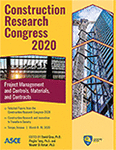Construction Research Congress 2020
Meta-Network Assessment of Intangible Risks in Portfolio of Projects
Publication: Construction Research Congress 2020: Project Management and Controls, Materials, and Contracts
ABSTRACT
This paper presents an intangible risk assessment framework and methodology utilizing a behavior-oriented intangible risk breakdown structure (IRBS), risk assignment matrix (RAM), and meta-network construct. The proposed approach conceptualizes a meta-network composed of different types of entities (i.e., agents, risk triggers, risk events, and tasks), as well as the interdependencies between them. The organizational interaction of actors (i.e., staff engineer to executive management), the impact of risk triggers (i.e., lack of clear priorities), behavioral risk events (i.e., lack of trust), and project tasks (i.e., basis of design) are networks in the meta-network. Project intangible risks are assessed for each stage of the project development cycle—feasibility/concept, front-end engineering design (FEED), and project execution)—in a case study of an oil and gas project portfolio. A methodology to catalog the risk triggers and intangible risk events is explored. This work contributes to the risk management discipline by providing a framework and methodology to address intangible risks in a structured and objective way at each stage in the project cycle.
Get full access to this article
View all available purchase options and get full access to this chapter.
REFERENCES
Barber, Richard B. (2005). “Understanding internally generated risks in projects.” International Journal of Project Management. 23(8):584-590.
Barabasi, A. (2013). Network Science. Cambridge University Press. Cambridge, United Kingdom.
Beringer, C., Jonas, D., Kock, A. (2013). “Behavior of internal stakeholders in project portfolio management and its impact on success.” International Journal of Project Management, 31(6), 830-846.
Breiger, R. L., Carley, K. M., and Pattison, P. (2003). Dynamic Social Network Modeling and Analysis : workshop summary and papers. Ronald Breiger, Kathleen Carley, and Philippa Pattison; Committee on Human Factors, Board on Behavioral, Cognitive, and Sensory Sciences, Division of Behavioral and Social Sciences and Education, National Research Council of the National Academies, National Academies Press
Carley, K. M. (2002). “Computational organizational science and organizational engineering.” Simulation Modelling Practice & Theory, 10 (5-7), 253
Carley, K. M., Diesner, J., Reminga, J., and Tsvetovat, M. (2007). “Toward an interoperable dynamic network analysis toolkit.” Decision Support Systems, 43 (Special Issue Clusters), 1324-1347.
Hillson, D. (2003). "Using a Risk Breakdown Structure in project management." Journal of Facilities Management, 2(1), 85-97.
Hofman, M., Spalek, S., and Grela, G. (2017). Shedding new light on project portfolio risk management. sustainability (2071–1050), 9(10), 1-19.
Isabella, L.A. (1992). “Managing the challenges of trigger events: the mindsets governing adaptation to change.” Business Horizons, 35(5), 59-66.
Lencioni, Patrick. (2002). The Five Dysfunctions of a Team: A Leadership Fable.: Jossey-Bass, San Francisco.
Liew, Z (n.d.). Project Management: Why Projects Fail. Online at www.projectsmart.co.uk/project-management-why-projects-fail.php (Jan. 2, 2017).
Morris, R.A. (2008). “Stop the Insanity of Falling Projects,”. Industrial Management, 50(6), 20-24.
Oil & Gas Authority, (2017). Lessons Learned from UKCS Oil and Gas Projects 2011-2016, Oil and Gas Authority, United Kingdom.
Olsson, R. (2008). "Risk management in a multi-project environment: An approach to manage portfolio risks", International Journal of Quality & Reliability Management, 25(1), 60-71.
Symonds, M (n.d.). “15 Causes of Project Failure”. ProjectSmart, https://www.projectsmart.co.uk/15-causes-of-project-failure.php. 1, 2016).
Teller, J. (2013). “Portfolio risk management and its contribution to project portfolio success: an investigation of organization, process, and culture.” Project Management Journal, 44(2), 36-51.
Williams, T., Klakegg, O.J., Walker, D.H.T., Andersen, B., Magnussen, O. M. (2012). Identifying and acting on early warning signs in complex projects. Project Management Journal, 43(2), 37-53.
Zhu, J., & Mostafavi, A. (2017). Metanetwork framework for integrated performance Assessment under uncertainty in construction projects. Journal of Computing in Civil Engineering, 31(1), 1-14.
Information & Authors
Information
Published In
Construction Research Congress 2020: Project Management and Controls, Materials, and Contracts
Pages: 692 - 700
Editors: David Grau, Ph.D., Arizona State University, Pingbo Tang, Ph.D., Arizona State University, and Mounir El Asmar, Ph.D., Arizona State University
ISBN (Online): 978-0-7844-8288-9
Copyright
© 2020 American Society of Civil Engineers.
History
Published online: Nov 9, 2020
Authors
Metrics & Citations
Metrics
Citations
Download citation
If you have the appropriate software installed, you can download article citation data to the citation manager of your choice. Simply select your manager software from the list below and click Download.
